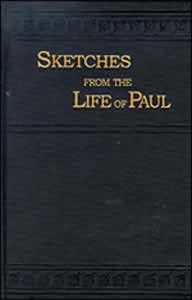EllenWhite.info — The Ellen G. White Information WebsiteDid God send a prophet? |
Return to http://www.ellenwhite.info/conybeare-howson-cleveland-f.htm.
|
Distortion #6: That Threatened Lawsuit
We need to quote the rest of the selection we quoted from last time from the video Sydney Cleveland particpated in:
|
Cleveland himself is certain that this was the case:
|
The Church defends her plagiarism by claiming it was common for writers of the 1800s to copy from one another without crediting sources. That defense is totally without merit for three reasons: First, Conybeare and Howson warned they would bring a lawsuit against Ellen White for copying so extensively from their book, Life and Epistles of Saint Paul. Their threat was significant enough for Ellen White to immediately withdraw her plagiarized book, Sketches from the Life of Paul, from circulation. Certainly there would have been no ground for a lawsuit and no reason for Ellen White to fear if it was common for writers in the 1800s to copy without crediting sources.—White-Washed, p. 200. |
 As Cleveland certainly must know:
As Cleveland certainly must know:
- The earliest account of a lawsuit is a 1919 book by arch-critic Dudley Canright, who never mentioned this charge in any of the 14 editions of his earlier 1889 book.
- An American publisher of Conybeare and Howson's book debunked this allegation in a 1924 letter, stating that they had never threatened suit and that they had no legal grounds to do so since the book was never copyrighted in the U.S. (That it was not copyrighted Cleveland admits to on p. 12 of White-Washed).
- A facsimile of this 1924 letter was reproduced in a 1951 book by F. D. Nichol entitled Ellen G. White and Her Critics, a book Cleveland has long been familiar with.
How then can Cleveland claim that there was a lawsuit?
Conybeare and Howson weren't stupid. British author Captain Marryat had already lost litigation in the 1840's when he found out that he would have had to have surrendered his British citizenship in order to obtain copyright protection for his works ("Nineteenth-Century British and American Copyright Law"). Any attempts at litigation on the part of Conybeare and Howson would have been money thrown to the wind, and everyone knowledgeable about publishing, writing, and copyrights in England, the U.S., and Canada in 1883 was well aware of that fact.
The real puzzle is why this charge has not yet been corrected in Cleveland's book. When we asked Cleveland's current publisher, a critic in his own right, what evidence he had of a lawsuit, he didn't have any. Instead, in his reply dated January 4, 2000, he attributed the allegation to mere hearsay: "I have always heard . . . ."
| Sketches from the Life of Paul Ellen G. White, p. 58 |
Life and Epistles of Paul Conybeare & Howson, p. 171 |
Scripture |
| Out of these 85 words, the only similarity not found in Scripture is the quotation marks. | Out of these 114 words, the only similarity not found in Scripture is the quotation marks. | |
|
"Sirs, why do ye these things? We also are men of like passions with you, and preach unto you that ye should turn from these vanities unto the living God, which made heaven, and earth, and the sea, and all things that are therein; who in times past suffered all nations to walk in their own ways. Nevertheless, he left not himself without witness, in that he did good, and gave us rain from heaven, and fruitful seasons, filling our hearts with food and gladness." |
"Sirs, why do ye these things? We also are men, of like passions with you; and we are come to preach to you the Glad Tidings, that you may turn from these vain idols to the living God, who made the heavens, and the earth, and the sea, and all things that are therein. For in the generations that are past, He suffered all the nations of the Gentiles to walk in their own ways. Nevertheless He left not Himself without witness, in that He blessed you, and gave you rain from heaven, and fruitful seasons, filling your hearts with food and gladness."3 3 "You" and "your" are the correct readings, not "us" and "our." |
And saying, Sirs, why do ye these things? We also are men of like passions with you, and preach unto you that ye should turn from these vanities unto the living God, which made heaven, and earth, and the sea, and all things that are therein: (Acts 14:15) Who in times past suffered all nations to walk in their own ways. (Acts 14:16) Nevertheless he left not himself without witness, in that he did good, and gave us rain from heaven, and fruitful seasons, filling our hearts with food and gladness. (Acts 14:17) |
|
Copyright © 2005 |
Send comments and questions by going to: /var/www/ellenwhite.info/web/FEEDBACK_EMAIL. |
 AdventWeb |